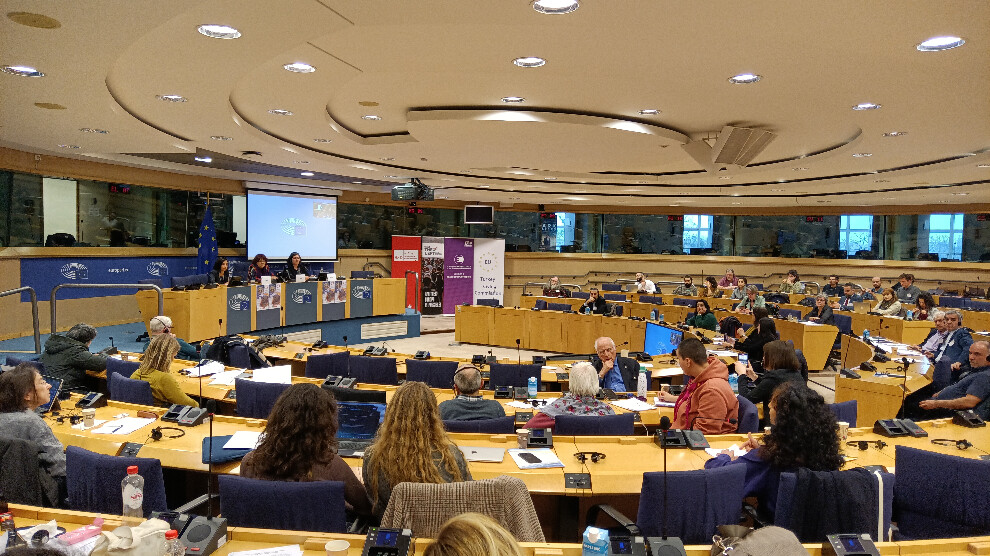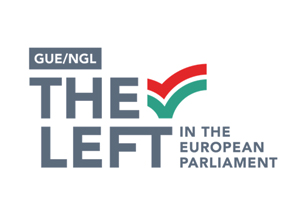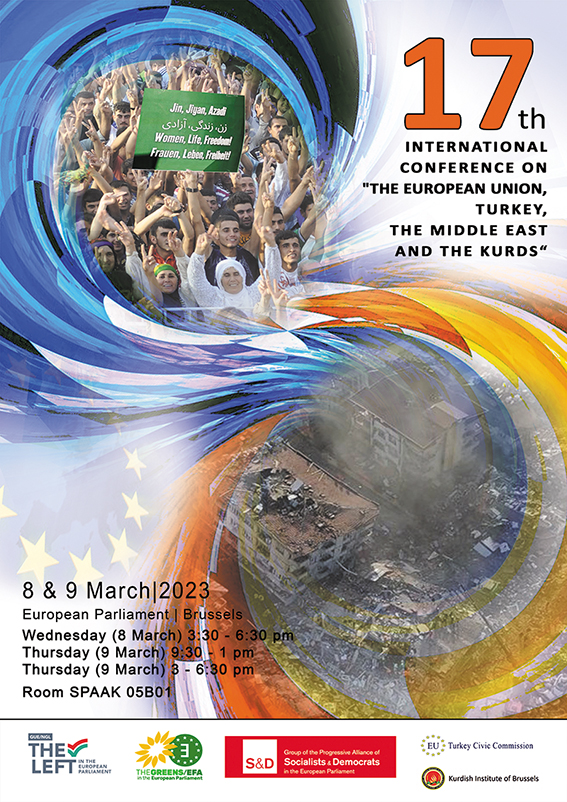The Annual International Conference on the EU, Turkey, the Middle East and the Kurds was hosted by the EU Turkey Civic Commission (EUTCC) in cooperation with the The Left Group, the Greens-European Free Alliance (GREENS/EFA), the Groups of the Free Alliance of Socialists and Democrats
(S&D) and the Kurdish Institute Brussels. The conference was successfully held on 8th and 9th of March 2023 in the European Parliament in Brussels.
At the beginning of February, a devastating earthquake shook Turkey, Kurdistan and Syria. Entire cities lay in ruins, tens of thousands of people lost their lives. The violent extent is not only the result of plate tectonics, but the result of greed for profit paired with the monistic state policy.
The EUTCC conference commemorates the victims of the earthquake. Turkey is called upon to immediately stop its attacks on northern Syria and to lift blockade on humanitarian aid by volunteers. The military inaction called by the PKK due to the earthquake must become bilateral.
The military inaction, but also the rubble of the earthquake, are not only the result, but also an opportunity for 100 years of the Republic of Turkey to overcome the monist state mindset and become a democratic republic.
In this context, the upcoming elections are a historic option that should be used by the opposition.
The EUTCC conference calls on the opposition to unite for democracy and peace and to act together against the attempt to ban of the Peoples` Democratic Party (HDP). The international community, and in particular the European Union and the Council of Europe, must send clear signals that they will not accept a ban on the second largest opposition party under any circumstances.
A historical and long overdue necessity is the opening of the gates of Imrali prison, which as a lawless space is the starting point for the most massive human rights violations in Turkey’s prisons. The European Union, the Council of Europe and in particular the CPT are called upon to exhaust all
mechanisms to end the lawlessness on Imrali and to allow lawyers unrestricted access to the island. The EUTCC Conference calls for a return to dialogue between the Turkish state and the PKK and the release of Abdullah Öcalan as a precondition for a sustainable solution.
This dialogue is also crucial for the future of Syria and the Middle East. The Autonomous Administration of Northern and Eastern Syria, whose social contract is based on the concept of democratic autonomy, is a possibility for a pluralistic democratic Middle East. In this way, the ethically and confessionally connoted lines of conflict, together with the war crimes – ecocide, genocide, feminicide, violation of international law – can bestopped and overcome. An important step will be the recognition of the Autonomous Administration of Northern and Eastern Syria by the
international community. In this context, the EUTCC conference refers to the obligation of states to repatriate their imprisoned ISIS fighters and putting them on trial. A tribunal is also needed on the ground.
The destabilising foreign policy effect of the current Turkish government policy also prevents the development of stability and security in the Kurdistan Region of Iraq. The assassination of Kurdish politicians, especially women, by Turkish drones in both Kurdistan Region of Iraq and Autonomous Administration of Northern and Eastern Syria must be brought to justice.
Since many states have politically recognised the attacks against Yezidis in Sinjar as genocide, all diplomatic and political mechanisms of the EU must be set in motion to prevent further attacks by Turkish drones against Yezidis. In any case, the Yezidis are suffering from the consequences of the 2014 genocide.
The EUTCC Conference calls on the United Nations, the OPCW and the International Criminal Court to address Turkey's war crimes and to launch independent investigations. The member states of the OPCW must use the options set out in its regulations to investigate the alleged use of chemical weapons by its member state Turkey. The international community, in particular the European Union, is called upon to fully defend international law in the context of Turkey and to impose sanctions for violations.
The European Union and Europe are responsible in the context of the Treaty of Lausanne, which was signed 100 years ago. The EUTCC conference calls on the European Union and the institutions and states of Europe to take all measures to prevent anti-Kurdish warfare on European soil. The Paris assassinations of 23 December 2022 must be solved. An important contribution of the European Union with regard to Kurdish society in Europe, but above all for a political solution of the Kurdish question, is the removal of the PKK from the terror list.
All these demands are also in the context of Jin Jiyan Azadi, the slogan that is going around the world with the Iran protests.
The EUTCC conference stands in solidarity with the people of Iran who have revolt against the murderous regime. There can only be an alternative if the diversity of the country can fully participate in political restructuring processes.
The EUTCC calls on the international community to make the slogan the maxim of its policy in its origin.
Brussel, 9 March 2023










